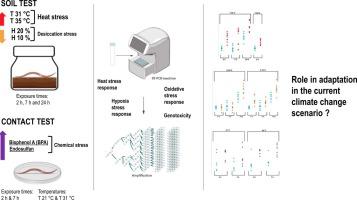当前位置:
X-MOL 学术
›
Environ. Toxicol. Pharmacol.
›
论文详情
Our official English website, www.x-mol.net, welcomes your
feedback! (Note: you will need to create a separate account there.)
Surviving in a multistressor world: Gene expression changes in earthworms exposed to heat, desiccation, and chemicals
Environmental Toxicology and Pharmacology ( IF 4.2 ) Pub Date : 2024-04-01 , DOI: 10.1016/j.etap.2024.104428 Natasha Tilikj 1 , Mercedes de la Fuente 2 , Ana Belén Muñiz González 2 , José-Luis Martínez-Guitarte 2 , Marta Novo 1
Environmental Toxicology and Pharmacology ( IF 4.2 ) Pub Date : 2024-04-01 , DOI: 10.1016/j.etap.2024.104428 Natasha Tilikj 1 , Mercedes de la Fuente 2 , Ana Belén Muñiz González 2 , José-Luis Martínez-Guitarte 2 , Marta Novo 1
Affiliation

|
An investigation of the effects of anthropogenic stress on terrestrial ecosystems is urgently needed. In this work, we explored how exposure to heat, desiccation, and chemical stress alters the expression of genes that encode heat shock proteins (HSPs), an enzyme that responds to oxidative stress (CAT), hypoxia-related proteins (HIF1 and HYOU), and a DNA repair–related protein (PARP1) in the earthworm . Exposure to heat (31°C) for 24 h upregulated HSPs and hypoxia-related genes, suggesting possible acquired thermotolerance. Desiccation showed a similar expression profile; however, the HSP response was activated to a lesser extent. Heat and desiccation activated the small HSP at 24 h, suggesting that they may play a role in adaptation. Simultaneous exposure to endosulfan and temperature for 7 h upregulated all of the evaluated genes, implicating a coordinated response involving multiple biological processes to ensure survival and acclimation. These results highlight the relevance of multistress analysis in terrestrial invertebrates.
中文翻译:

在多重压力世界中生存:暴露于高温、干燥和化学物质的蚯蚓的基因表达变化
迫切需要调查人为压力对陆地生态系统的影响。在这项工作中,我们探讨了暴露于热、干燥和化学应激如何改变编码热休克蛋白 (HSP) 的基因表达,热休克蛋白是一种响应氧化应激 (CAT)、缺氧相关蛋白(HIF1 和 HYOU)的酶,以及蚯蚓中的 DNA 修复相关蛋白(PARP1)。暴露于热(31°C)24小时上调热休克蛋白和缺氧相关基因,表明可能获得性耐热性。干燥表现出相似的表达谱;然而,HSP 反应的激活程度较小。加热和干燥在 24 小时激活了小 HSP,表明它们可能在适应中发挥作用。同时暴露于硫丹和温度 7 小时,所有评估的基因均上调,这意味着涉及多个生物过程的协调反应,以确保生存和适应。这些结果强调了陆地无脊椎动物多重应力分析的相关性。
更新日期:2024-04-01
中文翻译:

在多重压力世界中生存:暴露于高温、干燥和化学物质的蚯蚓的基因表达变化
迫切需要调查人为压力对陆地生态系统的影响。在这项工作中,我们探讨了暴露于热、干燥和化学应激如何改变编码热休克蛋白 (HSP) 的基因表达,热休克蛋白是一种响应氧化应激 (CAT)、缺氧相关蛋白(HIF1 和 HYOU)的酶,以及蚯蚓中的 DNA 修复相关蛋白(PARP1)。暴露于热(31°C)24小时上调热休克蛋白和缺氧相关基因,表明可能获得性耐热性。干燥表现出相似的表达谱;然而,HSP 反应的激活程度较小。加热和干燥在 24 小时激活了小 HSP,表明它们可能在适应中发挥作用。同时暴露于硫丹和温度 7 小时,所有评估的基因均上调,这意味着涉及多个生物过程的协调反应,以确保生存和适应。这些结果强调了陆地无脊椎动物多重应力分析的相关性。
















































 京公网安备 11010802027423号
京公网安备 11010802027423号